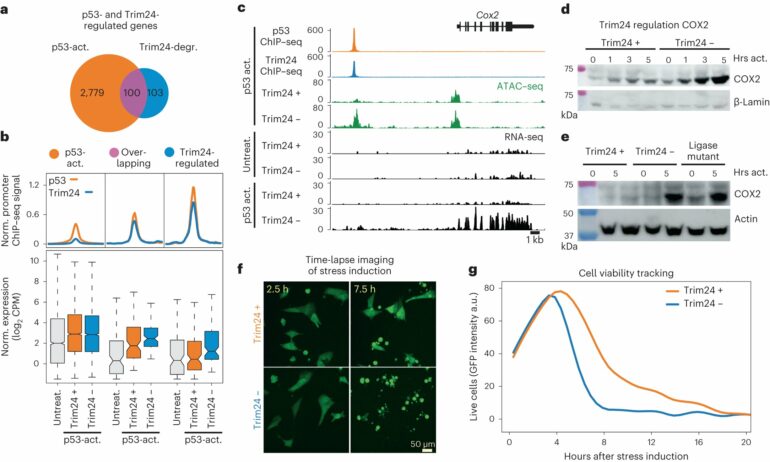The tumor suppressor protein p53 has been dubbed the “guardian of the genome” because it protects the DNA from stress or long-term damage by regulating the expression of numerous genes involved DNA repair, cell division and cell death. Now, FMI researchers have homed in on some of the mechanisms that regulate the activation of p53 target genes.
By stopping cells with mutated or damaged DNA from dividing, p53 helps prevent the development of tumors. The protein acts as a transcription factor that can be rapidly induced in response to various forms of cellular stress, resulting in immediate activation of genes involved DNA repair, cell division and cell death.
Unlike many other transcription factors, p53 can bind closed chromatin—a tightly packed form of DNA and proteins that suppresses gene expression by making the genome inaccessible to transcription factors. But it’s unclear how p53 engages closed chromatin and opens it up to activate target genes.
Luke Isbel, a postdoctoral fellow in the Schübeler lab, and his colleagues investigated how p53 binds to DNA in mouse embryonic stem cells and human tissues. The researchers found that the protein binds tightly packed stretches of DNA in both the mouse and human genome, yet its ability to loosen chromatin and turn on genes is regulated by another protein called Trim24. The study is published in the journal Nature Structural & Molecular Biology.
Trim24 localizes to p53 sites in closed chromatin, the researchers found. In the absence of Trim24, about half of 203 p53-regulated genes became strongly activated by p53.
The findings suggest that Trim24 typically limits p53 activity in closed chromatin, the researchers say. Because the levels of Trim24 are elevated in breast cancer and other types of tumors, the team speculates that the protein might limit the ability of p53 to function as a tumor suppressor in cancer cells.
More information:
Luke Isbel et al, Readout of histone methylation by Trim24 locally restricts chromatin opening by p53, Nature Structural & Molecular Biology (2023). DOI: 10.1038/s41594-023-01021-8
Provided by
Friedrich Miescher Institute for Biomedical Research
Citation:
Zeroing in on the workings of tumor suppressor protein p53, the ‘guardian of the genome’ (2023, June 30)



